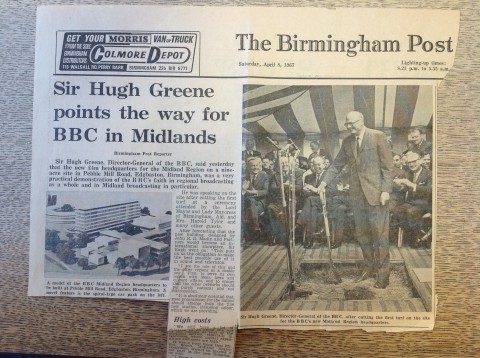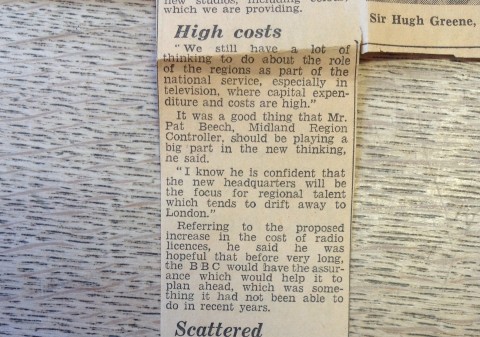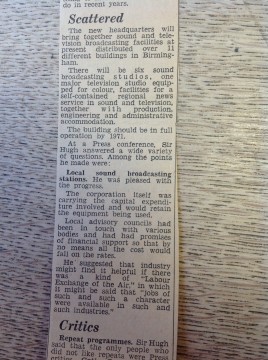Copyright resides with the original holder, no reproduction without permission.
This article about the Director General of the BBC, Sir Hugh Greene, cutting the first sod for the BBC Pebble Mill building was published by the Birmingham Post in April 1967.
I’ve re-typed the article here, to make it easier to read:
“Sir Hugh Greene points the way for BBC in Midlands
Sir Hugh Greene, Director-General of the BBC, said yesterday that the new £4m headquarters for the Midland Region on a nine acre site in Pebble Mill Road, Edgbaston, Birmingham, was a very practical demonstration of the BBC’s faith in regional broadcasting as a whole and in Midland Broadcasting in particular.
He was speaking on the site after cutting the first turf at a ceremony attended by the Lord Mayor and Lady Mayoress of Birmingham, Ald. and Mrs Harold Tyler and many other guests.
After forecasting that the new building, designed by John H.D. Madin and Partners would become an international showpiece, Sir Hugh went on: “This puts on us the obligation to make the best possible use of it in sound and television.
I see the role of this and the other regions as a double one. First, to serve it’s own region with ideas, news and current affairs, and to ensure that the other networks should be purely national and not metropolitan.
It is absolutely essential that good programmes for the nation should emerge from the fine new studios, including colour, which we are providing.
High Costs
We still have a lot of thinking to do about the role of the regions as part of the national service, especially in television, where capital expenditure and costs are high.”
It was a good thing that Mr Pat Beech, Midland Region Controller, should be playing a big part in the new thinking, he said.
“I know he is confident that the new headquarters will be the focus for regional talent which tends to drift away to London.”
Referring to the proposed increase in the cost of radio licences, he said he was hopeful that before very long, the BBC would have the assurance which would help it to plan ahead, which was something it had not been able to do in recent years.
Scattered
The new headquarters will bring together sound and television broadcasting facilities at present distributed over 11 different buildings in Birmingham.
There will be six sound broadcasting studios, one major television studio equipped for colour, facilities for a self-contained regional news service in sound and television, together with production, engineering and administrative accommodation.
The building should be in full operation by 1971.
At a Press Conference, Sir Hugh answered a wide variety of questions. Among the point he made were:
Local sound broadcasting stations. He was pleased with the progress.
The corporation itself was carrying the capital expenditure involved and would retain the equipment being used.
Local advisory councils had been in touch with various bodies and had had promises of financial support so that by no means all the cost would fall on the rates.
He suggested that industry might find it helpful if there was a kind of “Labour Exchange of the Air,” in which it might be said that “jobs of such and such a character were available in such and such industries.”
Critics
Repeat programmes. Sir Hugh said that the only people who did no like repeats were Press critics. Cathy Come Home had about as many viewers – 12m – when it was repeated.
“I can assure you that the public likes repeats,” he said. “I am not sure that we do not repeat enough. If you don’t repeat, television becomes a cery ephemeral thing. If you have something really brilliant, it should be seen more than once.
Licenses. “We are hoping for £6 licence fees from the beginning of 1968. This would not include a major service of local sound radio because we do not know if we are going to have it.
Colour
“We are allowing for colour, popular music programmes and everything else, and we estimate that another increase would not be required for four years after 1968.”
BBC2. He could not say what possibility there was for showing The Forsyte Saga on BBC 1. The only way to make BBC 2 popular was to give it some of the best programmes.
Documentaries. On the question of televising people in documentaries without their permission, Sir Hugh said that the same objection might be made about televising a football match because someone who was ostensibly at his aunt’s funeral was seen to be present.
“I would hop to have more and more programmes taken on location,” he said.
“Clean-up TV.” “There is some criticism which is so extreme as not to be taken seriously. We do not dismiss criticism. Social habits change. There is a great deal said in private, as well as on the stage and in films which would not have been said 30 years ago,” he said.
Asked if the BBC was not, in fact, setting the trend, he said it aimed at naturalness. Words would not be used merely to shock.”



